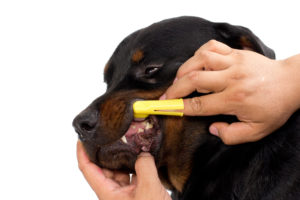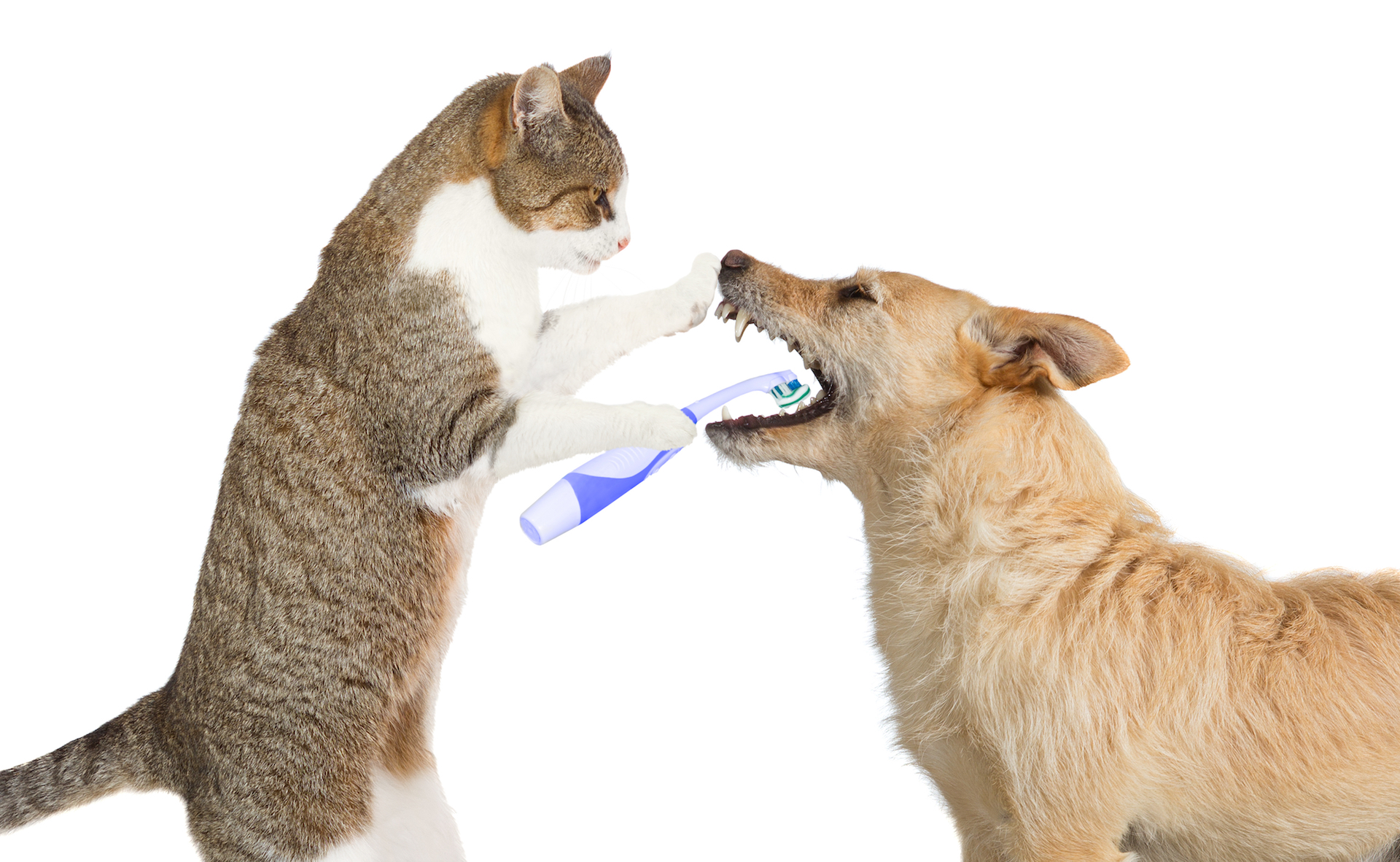 Did you know that by the age of 3, virtually all dogs and cats have some degree of dental disease? As a pediatric hygienist, I spend much of my time teaching parents the importance and how-tos of brushing their children’s teeth for them. Daily oral hygiene is essential in keeping their gums healthy and their teeth cavity free. Believe it or not, the same is true for your pets.
Did you know that by the age of 3, virtually all dogs and cats have some degree of dental disease? As a pediatric hygienist, I spend much of my time teaching parents the importance and how-tos of brushing their children’s teeth for them. Daily oral hygiene is essential in keeping their gums healthy and their teeth cavity free. Believe it or not, the same is true for your pets.
You’re probably thinking, “Is she serious? How am I ever going to find time in my busy life to brush Fido’s teeth? You want me to stick my fingers in his mouth?” You may believe that by feeding your pets a healthy diet of dry kibble, their teeth will remain clean enough. Although this may be helpful, regularly brushing your pet’s teeth is the single most effective thing you can do to keep their teeth healthy. There are many products marketed with claims that they improve dental health, but not all of them are effective. Ask your veterinarian for their recommendations.
 Dental disease can be incredibly painful, as well as detrimental to overall health and happiness. Because the pain associated with dental problems comes on slowly over time, your pet may simply learn to live with it and never show any signs of discomfort. Even worse, bacteria in their mouths may enter the bloodstream and ultimately damage their heart, liver, or kidneys. You may think this is a rare occurrence, but sadly, it is incredibly common.
Dental disease can be incredibly painful, as well as detrimental to overall health and happiness. Because the pain associated with dental problems comes on slowly over time, your pet may simply learn to live with it and never show any signs of discomfort. Even worse, bacteria in their mouths may enter the bloodstream and ultimately damage their heart, liver, or kidneys. You may think this is a rare occurrence, but sadly, it is incredibly common.
What can you do to help? The same thing that I have been urging parents to help their children with for the past 25 years. BRUSH THEIR TEETH!
I learned this the hard way with my cat, Tucker. I got him from a shelter when he was around 2 years old and unfortunately, he already had teeth and gum issues. Like humans, some cats and dogs are predisposed to periodontal issues. Luckily, I had a great vet. Her first question to me, knowing that I was a dental hygienist was, “don’t you brush your cat’s teeth?” Boy, did I feel small! She suggested a thorough cleaning under general anesthesia and urged me to begin daily care of his dentition. We recently celebrated Tucker’s 20th birthday! I am a firm believer that we can greatly extend our pets’ lives by proper dental care.
The Basics of Brushing
 Choose a tooth brush: There are many different styles on the market. Your local pet store or veterinarian may have a particular recommendation. I have had pretty good success with the finger brush.
Choose a tooth brush: There are many different styles on the market. Your local pet store or veterinarian may have a particular recommendation. I have had pretty good success with the finger brush.- Choose a toothpaste: DO NOT use regular human paste which may contain ingredients which are poisonous to animals. You know your pet best so choose a flavor that you think he’ll be most accepting of.
- How to brush: some pets will be more willing to cooperate than others. A slow, gentle approach, followed by treats, will eventually warm them up to the idea. This may take several days or even weeks. Don’t overdo it the first few times. Start slowly and quit if your pet becomes agitated. You can increase the time every day as they get more used to it.
- Begin by touching your cat or dog around the mouth while you cuddle them.
- Gently pull up his lip to look at his teeth.
- Give your pet a small sample of the toothpaste to taste.
Gently rub his gums and teeth with your finger. - Eventually, introduce a small angled brush or rubber finger brush.
- Always reward them with a treat.
Most pets will accept gentle brushing, but some may not. You may have to call it quits if he or she becomes too aggressive.
When to see a vet
Your veterinarian should check your pet’s teeth at his yearly exam. Have your pet’s teeth checked sooner if you observe any of the following:
- Bad breath
- Gum inflammation
- Abnormal chewing
- Excessive drooling
- Pawing at mouth
- Refusal to eat
Like regular grooming, dental care should be something your pet comes to expect each day. Daily brushing is best, but if it’s not possible, brushing several times a week can be effective. Ideally, introduce dental care when your pet is very young. But don't stress if you just realized that your adult pet’s teeth need some attention. Just take a slow, patient approach, and remember that lots of love and treats go a long way in winning him over.

By Kathy O’Brien , R.D.H.



